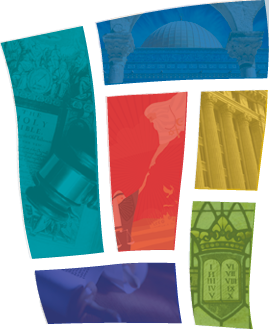
Great Christian Jurists in French History
edited by Olivier Descamps and Rafael Domingo
This volume is part of a fifty-volume series on “Great Christian Jurists in World History, “presenting the interaction of law and Christianity through the biographies of 1000 legal figures of the past two millennia. Commissioned by the Center for the Study of Law and Religion at Emory University, each volume in this series focuses on a specific country, region, or era, and it samples the life and work of a score or more of its greatest legal minds over the centuries. These legal minds include not only civil and canon lawyers and judges but also theologians, philosophers, and church leaders who contributed decisively to legal ideas and institutions, or who helped create landmark statutes, canons, or cases. Thus, familiar Christian jurists like Gratian, Grotius, Blackstone, Kuttner, and Scalia appear in this series, but so do Augustine, Isidore, Aquinas, Calvin, Barth, and Romero. This biographical approach is not intended to deprecate institutional, doctrinal, social, or intellectual histories of law and religion, nor will it devolve into a new form of hagiography or hero worship of dead white males. It is instead designed to offer a simple method and common heuristic to study the interaction of law and Christianity around the world over the past two millennia.
Columbia University Press opened this series in 2006 with a three-volume work on Modern Christian Teachings on Law, Politics, and Human Nature, featuring thirty modern Catholic, Protestant, and Orthodox Christian figures. Cambridge University Press has new titles on great Christian jurists in the first millennium, as well as in English, Spanish, French, Lowlands, and American history. Routledge is taking up the Italian, Nordic, Russian, Welsh, and Latin American stories; Mohr Siebeck the German story; Federation Press the Australian story. Forthcoming titles will cover great Christian jurists in the history of Scotland, Ireland, Austria, Switzerland, Greece, and various countries and regions in Eastern Europe, the Middle East, Africa, and Asia.
An Overview by the editors
Olivier Descamps and Rafael Domingo
This book on French Christian jurists examines the lives of twenty-eight key legal thinkers in French history, particularly the ways their Christian faith and ideals were a factor in framing the evolution of law and justice. All chapters have been written by distinguished legal scholars and historians, mainly from France but also from Belgium, Canada, Germany, Italy, Spain, Switzerland, the United Kingdom, and the United States. The collaboration among French and non-French scholars, and the diversity of international and methodological perspectives, gives the volume its unique character and value.
Of the twenty-eight selected jurists in this volume, six flourished during the second half of the sixteenth century, and nine lived during the nineteenth and twentieth centuries. The period of French humanism, when France snatched preeminence in legal scholarship from Italy to make the University of Bourges the leading law school in Europe, and the period of the late nineteenth century, when the science of public law was systematized, were momentous in legal creativity and imagination. Probably these periods exceed in importance the era of drafting the French civil code, although the civil code, without a doubt, has had the most global impact in French legal history.
The volume begins with three central figures of medieval canon law: Ivo of Chartres (introduced by Christof Rolker), Étienne de Tournai (by Ken Pennington), and Guillermo Durand (by Orazio Condorelli). The following chapters refer to two famous civil lawyers of the School of Orléans: Jacques de Revigny (by Paul du Plessis) and Pierre Belleperche (by Yves Mausen). Both shaped the renewal of Roman law teaching, and both rivaled the Glossators of Bologna in their mastery of the Corpus Iuris.
After the invasion of the Italian peninsula by King Charles VIII of France, in 1494, the artistic and literary atmosphere of the Italian Renaissance influenced French culture. The Italian jurist, Andrea Alciato, became the forerunner of French humanism by introducing the historical method into legal teaching. Reading this volume helps understand the significant connections among legal humanism, the Calvinist reformation, the University of Bourges, and the mos gallicus. Humanism is a much-branched cultural movement; Calvinism, a religious reform movement; the mos gallicus, a legal method to interpret the ancient sources; and the University of Bourges, a venerable French university. These four realities are quite varied, but they are all interconnected. Our six selected jurists of the sixteenth century are, chronologically, Charles Dumoulin (by Wim Decock), John Calvin (by John Witte, Jr.), Jacques Cujas (by Xavier Prévost), François Hotman (by Mathias Schmoekel), Hugues Doneau (by Christian Hattenhauer), and Jean Bodin (by Daniel Lee).

Over the seventeenth century, France continued the process of nationalization of its law, led more by judges and lawyers of the Parliament of Paris than by legal scholars. A French common law (droit commun de la France) arose based on customs, droit écrit, royal ordinances, and case law from the parliaments. French jurists tried to deal with this plurality of sources of French law by providing a unified and coherent systematization. The selected jurists from this period are Jean Domat (by David Gilles), Henri François d’Aguesseau (by Isabelle Brancourt), and Robert-Joseph Pothier (by Olivier Descamps).
Inspired by liberal principles and radical ideas, the French Revolution deeply changed the course of modern French and Western history. By declaring the Rights of Man and of the Citizen and abolishing privileges of the nobility and the clergy, the Revolution sought to establish a free and equal society under the same unified legal system. In the years following the Revolution, however, churches were closed and converted into storage places, warehouses, or even stables, and religious worship was suppressed.
The Napoleonic era, comprising the Consulate and the Empire was decisive for the history of France. One of the essential contributions of the Napoleonic era was codification. In August 1800, Napoleon appointed a commission composed of four brilliant lawyers, whose mission was to draw up a civil code for all of France. In chapter fifteen, Nicolas Laurent-Bonne introduces the controversial figure as a leading jurist during the preparation of the Civil Code: Jean-Étienne Portalis, both a Gallican Catholic and a liberal Freemason.
The nineteenth century in France was full of wealth and development in many different fields. Constitutions and constitutional charters varied according to the institutional system chosen. These changes raised questions and often prompted a critical look at French institutions. It is not surprising that Alexis de Tocqueville (by Mary Ann Glendon) obtained from the July Monarchy a mission to examine prisons and penitentiaries in the United States. This was the genesis of his famous Democracy in America (1835-1840), in which he explored the success of the republican representative government in the young nation.
A decisive moment of the French nineteenth century was the Battle of Sedan in 1870, during the Franco-Prussian War. Napoleon III was captured and the French army decisively defeated. This painful episode for France, which ultimately lost Alsace and Lorraine (1871), was also the starting point for establishing a new political regime, the Third Republic. It took ten years to finally stabilize the new republican regime. Uncertainty and hesitations about the best form of government (monarchy or republic) testified to the division of French society. The legacy of the French Revolution pitted conservatives against republicans. In 1905, the Law on the Separation of the Churches and the State was passed by the Chambers of Deputies. It consecrated the principle of state secularism in France (laïcité).
By declaring the Rights of Man and of the Citizen and abolishing privileges of the nobility and the clergy, the Revolution sought to establish a free and equal society under the same unified legal system.
In this complex and divided French society, jurists did not remain insensitive. This was true of Paul Viollet (by Anne-Sophie Chambost), and of Paul Fournier (by Brigitte Basdevant-Gaudemet and Rafael Domingo). Marco Sabbioneti introduces Raymond Saleilles, who tried to “redesign French legal culture from within.” Rallying the Republic but not accepting moral relativism was one of the aspects of Maurice Hauriou’s thought, introduced by Julian Barroche. Working from recent developments of social science, Hauriou vigorously expressed convictions that he nourished with historical analysis based on his initial discipline of the history of law. Hauriou entered into controversies with Leon Duguit (by M. C. Mirow), a leading French scholar of public law. Criticism of modernity was still one of the points of Georges Ripert’s thought (by Frédéric Audren). A conservative but also a firm opponent of natural law, Ripert advocated for the inspiration of the legal system by Christian moral principles, especially in the area of the law of obligations.
Neo-Thomism was at the center of Jacques Maritain’s political and legal thought. Introduced by William Sweet, Maritain’s influence has been very deep and spread around the world, especially in the Universal Declaration of Human Rights. In this period, the implementation of European integration owes a debt to the courage and imagination of some men who shared the Catholic faith. Among them, Robert Schuman (by Rafael Domingo), played a decisive role.
New developments arose in a French society undergoing reconstruction during the postwar years. Among the Catholic jurists of that time, Gabriel Le Bras (by Kathleen G. Cushing), occupied a place of honor. During the 1960s, in addition to the aggiornamento of the universal Church with the Second Vatican Council, social evolution led the French legislature to important legal reforms, notably in family law. Jean Carbonnier (by Laetitia Guerlain), was the leading jurist of all family-law reforms between 1964 and 1975. Another well-known jurist, Michel Villey (by Luisa Brunori), opposed the individualistic trends of French society, and he especially criticized the dominant legal positivism.
In summary, the Christian contribution to French law is enormous, as is the French Christian contribution to Western legal systems and the idea of law in general. French Christian jurists have been present at the birth of medieval canon law and the European ius commune. In the sixteenth century, they were also present at the birth of the first legal systematization of private law, the birth of the mos gallicus as a method of legal development, the birth of the idea of French law, the birth of the nation-state, individual rights and liberties, and especially the birth of religious freedom. French Christian Jurists helped set in motion the period of codification in the eighteenth century, the movement for constitutionalism in the nineteenth century, the systematization of public law at the turn of the twentieth century, the foundation of legal sociology, the movement of human rights, and the European integration in the twentieth century. French Christian jurists have been present at the beginning of all Western legal revolutions from the Middle Ages to our day. ♦

Olivier Descamps is Professor of Law and Legal History, Panthéon-Assas University (Paris II) in France.

Rafael Domingo is Spruill Family Professor of Law and Religion at Emory University and Alvaro d’Ors Professor of Law at the University of Navarra. You can follow him on Twitter @RafaelDomingoO1.
Recommended Citation
Descamps, Olivier and Rafael Domingo. “Great Christian Jurists in French History – An Overview by the editors.” Canopy Forum, August 6, 2020. https://canopyforum.org/2020/08/06/great-christian-jurists-in-french-history/

